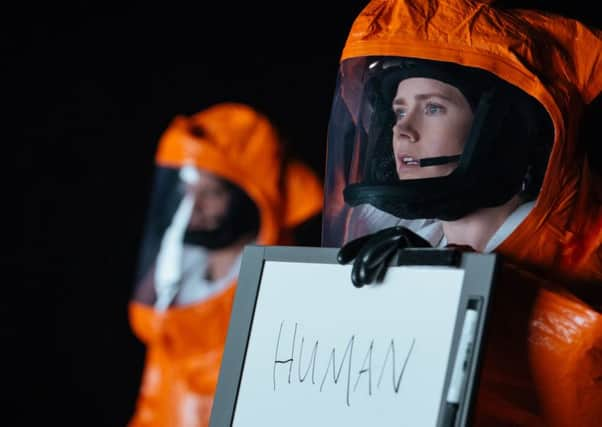Film reviews: Arrival | 16 Years Till Summer | The Innocents


Arrival (12A) *****
16 Years Till Summer (12A) ****
The Innocents (15) ****
Sci-fi with a big emotional sweep is tough to get right. For every Spielberg masterpiece like Close Encounters of the Third Kind, E.T. or the contentiously brilliant A.I., there’s a portentously goofy imitator like Robert Zemeckis’s Contact, M Night Shyamalan’s Signs or Jeff Nichols’ over-wrought Midnight Special – films that copy the emotional beats of those aforementioned Spielberg classics instead of crafting new ones from their characters’ own supposedly unique situations. What’s immediately striking about Denis Villeneuve’s new alien contact movie Arrival is its willingness to do the latter by zeroing in on its heroine so completely that any echoes of other movies remain just that – echoes.
Beginning with Amy Adams’s character reflecting on her life caring for her terminally ill daughter, the film almost dares us to scoff at such blatant heartstring tugging so early in proceedings, not least because her character, Dr Louise Banks, is a linguist – yet another dedicated professional with a tragic history. But while that may sound clichéd, especially in a genre that has imagined similar scenarios for other female protagonists (see Sandra Bullock in Gravity or Sigourney Weaver in James Cameron’s director’s cut of Aliens), the film transcends this stereotype in an intriguing way. Louise may be scarred by her daughter’s illness, and that may in turn feed into her subsequent mission to communicate with the alien life-forms that have arrived in 12 matching, shell-like spacecraft, each stationed in a different country – but not in the way you might imagine.
Advertisement
Hide AdIndeed, so good is Villeneuve at drip-feeding information throughout the film that when he engages in a sublime piece of narrative jujitsu late on, trying to unravel everything Adams actually does in the role is one of Arrival’s chief pleasures. But the film is pretty good at playing with the tropes of the genre as a whole. The alien invasion is deftly handled on a small, realistic scale by having Louise learn of it from some bored students checking their smartphones during a poorly attended lecture (a later explanation for their choice of location is amusingly offset with a random reference to Bellshill’s finest, Sheena Easton). And when introducing us to the hovering alien shell and its tentacle-clad extra-terrestrial inhabitants for the first time, Villeneuve more than justifies the awe and wonder we first see sketched across the faces of Adams and co-star Jeremy Renner (cast here as a theoretical physicist and gamely embracing his character’s apparent position as “token love interest”).
What follows is an urgent, multi-layered mystery as Louise attempts to crack the alien language before the governments of the world collectively panic themselves into individual acts of aggression that might destabilise things even further. Though it’s not hard to miss the political significance of a film about the need for international co-operation at a time when divisiveness and isolationism has become the norm, Villeneuve doesn’t over-state this and nor does he amp up the spectacle to match the emotional turmoil of the characters in the way Christopher Nolan’s Interstellar did. As stunning as Villenueve’s visuals are, they never overwhelm proceedings because, in the end, there’s nothing more powerful here than the sight of Adams wrestling with Louise’s intensifying awareness of the shape of her own life as it collides with these extraordinary events. She may ground Arrival, but she makes it spectacular whichever way you look at it.
Arriving in the wake of this year’s excellent Where Your’re Meant to Be, Lou McLoughlin’s 16 Years Till Summer is another quietly brilliant example of some of the great narrative documentary filmmaking currently being done in Scotland. It’s the story of Uisdean, a middle-aged man furloughed from prison after 16 years inside to care for his invalid father. What begins as a gentle story of rehabilitation and reconciliation in the Highlands – they live in a picturesque croft on the edge of Lochcarron – deepens into something stranger and more compelling as revelations about its subject’s crime suggest his modest hopes for the future may not be all that achievable. McLoughlin’s approach is impressionistic; she never quite gives us the full picture of what Uisdean has done, choosing to let him detail his own story without too many explanatory intertitles or any supporting news footage. But the picture she builds up through careful and close observation of Uisdean with his father and, later, with the woman who makes it her mission to befriend him, is a remarkable one – as quietly damning as it is tragically hopeful.
The Innocents is a film full of horror and dread that barely shows us anything. Be thankful for that last fact. Inspired by the true story of a French Red Cross worker secretly enlisted by a Polish convent to deal with a spate of pregnancies in the immediate aftermath of the Second World War, Anne Fontaine’s film remains an unstinting dramatisation of the shame and trauma of war without need of show the ordeals suffered by these nuns at the hands of the Russian soldiers who raped them. Instead it focuses on the consequences of this atrocity as these women privately reckon with their faith and unexpected motherhood while desperately trying to keep their “shame” from the outside world, fearful as they are of not just the ongoing threat from the soldiers but of the external judgment of a newly Communist country. ■